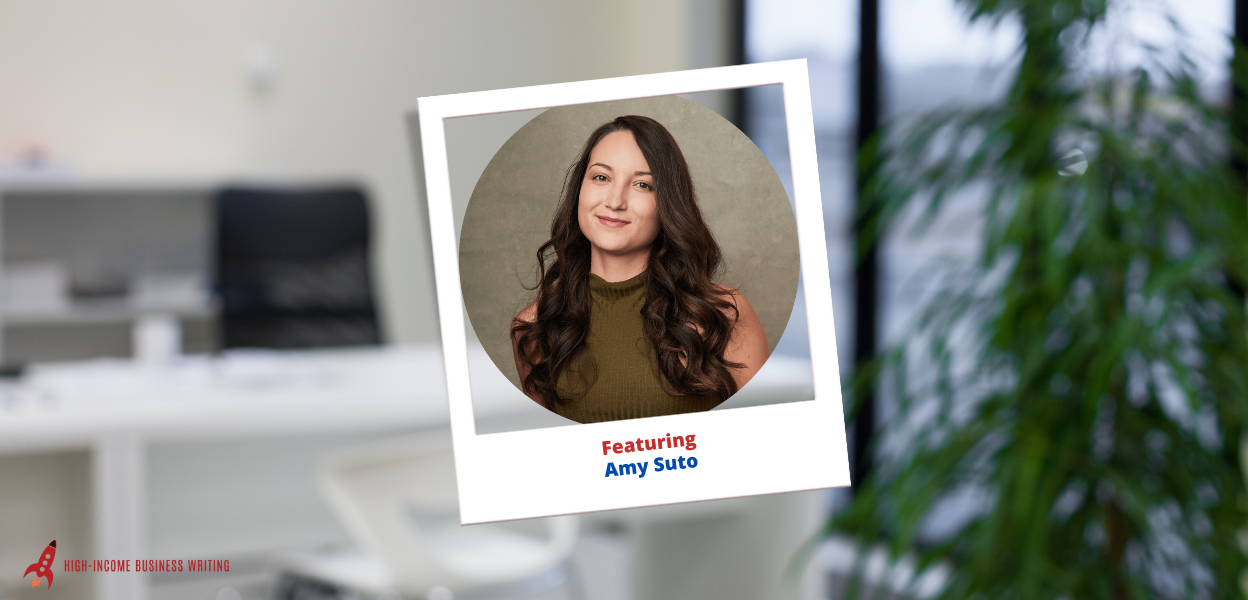The real test of the strength of your own positioning, messaging and marketing is when the economy is challenging.
Not when clients are flush with cash and enjoying overinflated marketing budgets — as they were over the past three years.
That’s why it’s so important to continually improve your own marketing skills and habits. And that’s why the topic of marketing your business will be a recurring theme in this podcast and in my newsletter for the next few months.
Because, frankly, the past few years have made us soft. It was too easy to land work.
My guest in this week’s episode is Amy Suto, a freelance memoir ghostwriter and Amazon KDP publishing expert. What I find impressive about Amy’s business is that over the course of a few short years she’s been able to go from earning $30 an hour as a freelance writer to earning a whopping $750 an hour.
Not only that, but she’s continually booked solid at that rate. And she does this while spending a big part of the year traveling and working from beautiful locations all around the world.
It almost sounds too good to be true, doesn’t it?
In this episode Amy explains where she started, how she got to her current level of success, what she does to continually attract her ideal clients, and how she can command these ultra-high-end rates.
(Hint: narrowing down your focus is a big part of her secret!)
We talk a lot about strategy, but we also get tactical. It’s a great conversation for any writer, regardless of where you are in your journey.
The notes that follow are a very basic, unedited summary of the show. There’s a lot more detail in the audio version. You can listen to the show using the audio player below. Or you can subscribe on Apple Podcasts, Spotify, Stitcher, Google Podcasts, Amazon Music or wherever you listen to podcasts.


High-Income Business Writing with Ed Gandia
#331: Marketing Strategies of a Digital Nomad Ghostwriter Earning $750 per Hour
Key Topics and Bullets:
- Starting the freelance journey during the pandemic
- Benefits of being a digital nomad for writing and understanding clients
- Choosing a niche to attract clients and position oneself as an expert
- Building a blog with SEO to attract clients
- Utilizing platforms like Upwork for exposure and client acquisition
- Considering alternative platforms like Contra for fee-free options
- Positioning oneself as a high-value expert
- Capitalizing on the advantages freelancers have in providing attention to detail and care
- Understanding where ideal clients spend their time digitally and physically
- Importance of niche keywords for driving traffic and generating business
- Demonstrating value and track record to justify higher rates
- Dealing with backlash and proving worth over time
- Enhancing understanding and discussing complex subjects face-to-face
- Competitive advantage as a digital nomad in engaging with clients from different cultures
- Range of project rates depending on scope and requirements
Timestamp Overview:
[00:01:22] Ed– And, you know, I see so many people who took their foot off the gas over the past years. Now they don’t have the the skills, the chops, and the muscle tissue to really, you know, be able to deal with the current reality. I mean, what’s your take on that?
Amy– Yeah. I think that that insight is so accurate in terms of it just felt like there was such a boost, especially when everyone was stuck At home and investing in their businesses and getting COVID stimulus packages, and everybody was just kind of ready to, you know, throw all this money at freelancers. And then when that started to wane and we started to kind of get into the times that we’re in, it’s definitely been, a a shift in the marketplace, but that doesn’t mean that there’s not A ton of great opportunities to really kind of find the clients that are your ideal clients, that are really excited to work with you and really excited to to kind of, like, engage with your services in but you just have to find them and then also speak their language and then also have them find you through different ways in terms of, like, SEO and And kind of creating these magnets to pull clients to you in a way that they’re just, like, really excited to work with you when they find you through these different channels.
[00:05:37] Ed– You said you know, you started a few years ago, and like many of us, You started really low, bargain basement level. So give us a little bit of context and a little bit of history.
Amy– Yeah. So I started freelancing around 7 years ago, and I was doing it just part-time on the side. I was actually trying to be a writer in Hollywood, and I was working minimum wage assisted jobs, working my way up the ladder, and I started moonlighting as a freelancer. And I started to see that my skills as a freelancer, were getting more in demand than my skills as a TV writer in Hollywood. And so I started ghostwriting memoirs and doing copy for different businesses and just really kind of Growing that slowly. And when the pandemic hit in 2020 and everything shut down, I was just like, you know what? I don’t think Hollywood is going to give me the kind of life that I want. Wanna travel. I wanna see the world. Quit Hollywood, full-time freelance, traveled, digital nomad, ghostwriting.
[00:09:57] Ed– Okay. So let me play devil’s advocate. Amy, that sounds great, but I don’t want to limit myself. Like, I’ve had other clients that I like too. And what if I narrow it down to a point where now nobody’s going to, You know, I’m gonna miss out on all these other opportunities. What would you say to that?
Amy– I think that if you if you had the choice to hire somebody to, let’s say, Pair your car. Do you wanna hire somebody who let’s say it’s a vintage car? Do you wanna hire somebody who’s, like, a pretty good mechanic at working on a lit a lot of different cars, Or do you wanna hire somebody who is specific to that type of car that you have and they’re an expert and they have had their 10 hours and fixing cars like yours and so you know you’re gonna be in good hands. It’s like you could hire the generalist, but if you have an expert in front of you who maybe charge a little bit more, but they have the experience where you know you’re gonna get a good experience and you know that your car is gonna be fixed properly, you’re gonna probably go with the expert. Hiring an expert for specialized car repairs.
[00:13:23] Ed– I have the saying that when you really dial it in and you really narrow it down, What it does is it, forces you to focus on whom you pursue, but it doesn’t limit whom you accept, Which is a Definite. Very important distinction. Right? It’s like if somebody could come out of the blue through a referral or whatever and listen, I need help and it’s outside of what you’re saying on your website you focus on. But let’s just say that it sounds like an amazing opportunity. You can accept that opportunity if it makes sense for you. Right? It doesn’t really limit that. Have you have you seen that?
Amy– Yeah. Definitely. I think that’s a great way that you put it. Because I think that when you’re trying to attract those ideal clients that are looking for that expert, you wanna make sure that everything, You know, really screams you’re an expert, but if you’re too general and too vague, you’re gonna miss those people as well as people who are just, You know, come across you and think you’re great and want you to work on a project that might not be exactly related to your niche. Attract ideal clients, and avoid being too vague.
[00:15:23] Ed– Well, let’s talk about where these ideal clients hang out. Right? Let’s say I’ve made some decisions, and I’m nervous about it, but I’m doubling down And I’m taking Amy’s word for it. Where are these people?
Amy– So when you’re kind of getting started as a freelancer, you have to do a lot of groundwork of going out and finding these ideal clients. And so, earlier on in my freelancing career, I would go to conferences and I would make my way to becoming a speaker at conferences, and, I did a lot of traveling. And so trying to under…identify, like, where do they spend time physically in the real world, where do they Spend time online, what social media platforms are they on? And if they’re on if all of your ideal clients are hanging out on LinkedIn every day, then you should be on LinkedIn. If they are all on, you know, x or Twitter, then you should be there.
[00:19:04] Ed– I don’t I don’t wanna get in the weeds with these next Two follow-up questions, but I do want to address them, about platforms like Upwork and blogging. Let’s start with Upwork because you mentioned that one. If if I’m in there I use it as a way for people to find me because it is a very powerful Search engine. And I’m also using it because I’m so narrowly niched. Are you saying that the Real benefit there is that people will find your name and then maybe go to your website, or are you stuck now working with clients Through these platforms which, you know, take a big chunk of your fee?
Amy– I think it kinda depends from freelancer to freelancer. Personally, I don’t mind working on platforms like Upwork because, you know, the fee that I would pay to Upwork is something that I’ve you know, I consider it a finder’s fee for clients that wouldn’t have found Me elsewhere. And there’s you know, when I’m when I’m doing a big project on Upwork, it’s not that big of a deal to, like, give a percentage to the platform that is feeding me these leads and and sending me clients. But if you’re a freelancer who really is against those platforms, it’s kind of up to you because, like, there are platforms like Contra, for example, that don’t take a percentage of any of your projects. And just having a platform on there, you can work on the platform, you off the platform. So understanding just being on the platform is really helpful, and you can decide from there how you’re gonna operate with the platform in regards to their terms of Service and all that jazz, but I think that just existing on the Internet and as many places as possible is always the good thing. Opinions on freelancing platforms vary among freelancers. Some don’t mind paying fees for clients, while others prefer fee-free platforms like Contra.
[00:24:16] Ed– Let’s talk a little bit then about, I wanna come back to what you said at your hourly rate, you know, and I know you don’t charge by the hour, but, you know, you have gotten your earnings a point where you’re averaging 7.50 an hour. That’s huge. So can you maybe share a little bit about What’s enabled you to net that for every hour you put into your business?
Amy– Recently, I have started charging by the hour for ghostwriting and for book editing. And I think that but no matter if you charge by the hour or not, I think it’s really important to understand that as freelancers, the ideal number of hours that you wanna work in a week or a year and also considering all of the expenses that come with running your own business, like, your hourly rate is naturally gonna be a lot higher than Somebody who’s working for a company. Because if you’re an employee, your health insurance is usually covered, you have benefits, you have all these things. And if you’re a freelancer and you’re running your own business, you pay for your own health insurance. You pay for your own subscriptions. And so making sure that you have a high hourly rate and getting to At least $100 an hour as quickly as you can when from the moment you start freelancing is really important. And when you kind of start to surpass $100 an hour as a freelancer, You’re able to do even better work for clients.
[00:28:34] Ed– If you’re gonna be at that level, you have to support it. You have to build all this credibility and value Context around it. No doubt. So how do you even even then, Do you sometimes find some prospects who, when you get to that discussion, are completely Shocked by by the number? And how do you handle that?
Amy– I’ve gotten and this happened when I changed my rate. I went from 2:50 an hour to 3.50 an hour. Well, that was like my 1st jump last year. And when I changed my rate to that, initially, when I first moved my rate to that first number, I just got a huge backlash from potential clients who were in and people being like, how do you charge that much? Does this seem real? And then slowly when I started getting clients and building up that social Proof that number completely disappeared. You can get a little bit of backlash when you’re charging more than some people’s lawyers, and I understand that.
[00:29:27] Amy– And so but then when I started Landing projects at 7:50 an hour because people saw the value, and I was able to show that track record on Upwork and be like, hey. Look. This is, I’m charging and people are paying, You know what I’m charging and they’re happy with the work and they’re really, you know, excited about what I’m providing for them and the value makes sense.
[00:32:31] Ed– Well, how much do you figure this whole project is going to cost? Because with hourly, that’s always the question, Which I find hilarious. People want an hourly rate, but then they’re also gonna wanna know how much it’s going to cost. So, what is your average book project Be by the time it’s all said and done.
Amy– Yeah. It really just depends because sometimes clients like me, I’ll fly out to meet them. Sometimes they’ll also want my help with publishing, and so projects can be anywhere from, like, 60 to 100 k depending on what’s included and what they want up with, and then how they wanna work with me in the different styles of working with me, whether that’s me being there in person or us doing things virtually and things like that. So it really just kinda depends, and not those rates are not too far away from a lot of the standard book ghostwriter rates. Variable rates for projects depending on the client’s preferences and requirements.
[00:36:19] Ed– You have basically a white glove luxury experience here, and you’re able to charge a premium for that. In fact, I would even say that if you were too low with a lot of these clients, they would be concerned.
Amy– Definitely. And I think that that’s something that is really surprising, and I’ve seen other freelancers talk about this too, where sometimes they’ll have, like, a mid-tier offering and then Premium tier offering, and their premium tier offering at the higher price point will sell so much better than their mid-tier offering.
[00:40:42] Amy– But, yeah, it was really it’s been really neat to be able to go and meet my clients in different places. I’m in New York several times a year to meet up with some of my clients there. And so it’s really nice to be able to, like, have this ability to go to people in person because even though I think you can get a lot done on Zoom, asynchronous work is An incredible way to work through things creatively and collaboratively if you know how to use it right.
[00:44:29] Ed-You know, you don’t know who’s got a rodent problem, You know, in their house or an ant problem. So I think it’s really smart that you’ve really, emphasized And focus so much on attraction marketing because, for you, it’s a must. There’s no way around it.
Amy– Definitely. And I think that different types of freelancing require different types of marketing just like you were you were saying. When I was more in tech copywriting and web three copywriting, I could send out cold emails, and, like, 8 out of 10 of them would turn into clients. But when it comes to book ghostwriting, you can’t People aren’t if they’re not thinking about writing a book, they’re not gonna be writing a book.
[00:45:22] Ed– Tell us about your book and where people can learn more about you, what you do, and connect with you.
Amy– So earlier this year, I released a book called The 6 Figure Freelance Writer, and it’s basically part travel memoir, but also mostly, a guide on how to build a holistic career as a freelance writer.
By the way… whenever you’re ready, here are 3 ways I can help you grow your freelance business:
- Grab a free copy of my book.
It’s called Earn More in Less Time: The Proven Mindset, Strategies and Actions to Prosper as a Freelance Writer. The title says it all. ? — Click Here - Join my implementation program and be a case study.
I’m putting together a new implementation group this month. If you’re earning $5k+/month (or the part-time equivalent) from your freelance business … and you’d like to grow your income quickly with better clients … just email me at ed@b2blauncher.com - Work with me privately.
If you’re a 6-figure writer who’s trying to earn more in less time, with less stress, I might be able to help you get there faster than you think. Just email me at ed@b2blauncher.com and put “Breakthrough” in the subject line, and I’ll get back to you with more details.






